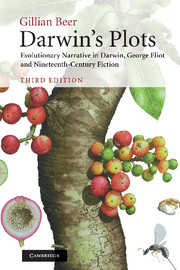Book contents
- Frontmatter
- Contents
- Foreword by George Levine
- Preface to the first edition
- Preface to the second edition
- Preface to the third edition
- Introduction
- Part I Darwin's language
- Part II Darwin's plots
- Part III Responses: George Eliot and Thomas Hardy
- 5 George Eliot: Middlemarch
- 6 George Eliot: Daniel Deronda and the idea of a future life
- 7 Descent and sexual selection: women in narrative
- 8 Finding a scale for the human: plot and writing in Hardy's novels
- 9 Darwin and the consciousness of others
- Notes
- Select bibliography of primary works
- Further reading related to Charles Darwin
- Index
9 - Darwin and the consciousness of others
Published online by Cambridge University Press: 04 August 2010
- Frontmatter
- Contents
- Foreword by George Levine
- Preface to the first edition
- Preface to the second edition
- Preface to the third edition
- Introduction
- Part I Darwin's language
- Part II Darwin's plots
- Part III Responses: George Eliot and Thomas Hardy
- 5 George Eliot: Middlemarch
- 6 George Eliot: Daniel Deronda and the idea of a future life
- 7 Descent and sexual selection: women in narrative
- 8 Finding a scale for the human: plot and writing in Hardy's novels
- 9 Darwin and the consciousness of others
- Notes
- Select bibliography of primary works
- Further reading related to Charles Darwin
- Index
Summary
The name and work of George Romanes relate strongly to my chosen topic and he will have a place in my argument. George Romanes was one of the most creative inheritors of Darwin's insights concerning consciousness and instinct. In Animal Intelligence (1882), Mental Evolution in Animals (1883) and Mental Evolution in Man: Origin of Human Faculty (1888) Romanes sought by means of example and anecdote to build a secure argument for the growth and continuity, as well as the variety, of emotion and awareness among all sentient creatures, including the human. But it was not only Darwin's theories that inspired Romanes, it was the man. He loved Darwin, his older friend, and grieved poignantly when Darwin died. In the long poem he wrote as a memorial there are passages that speak powerfully to the absolute experience of loss endured at the death of a friend, as well as offering a particular tribute to Darwin:
Too late! Too late! For ever more too late!
Oh, change all overwhelming – absolute!
A change no thought can compass, gauge, or state!
A change from highest being to a mute
And empty void! The living man I knew –
The mighty structure of a peerless mind –
The friend whose soul was open to my view –
An ordered world, as definite in kind
As is this planet – full as are the skies
Of systems within systems, reason-ranged –
All vanished – blotted out before mine eyes!
This is the change; and with it I am changed
To-day that universe for me doth end,
Which lost a world who was my living friend.
- Type
- Chapter
- Information
- Darwin's PlotsEvolutionary Narrative in Darwin, George Eliot and Nineteenth-Century Fiction, pp. 242 - 255Publisher: Cambridge University PressPrint publication year: 2009



